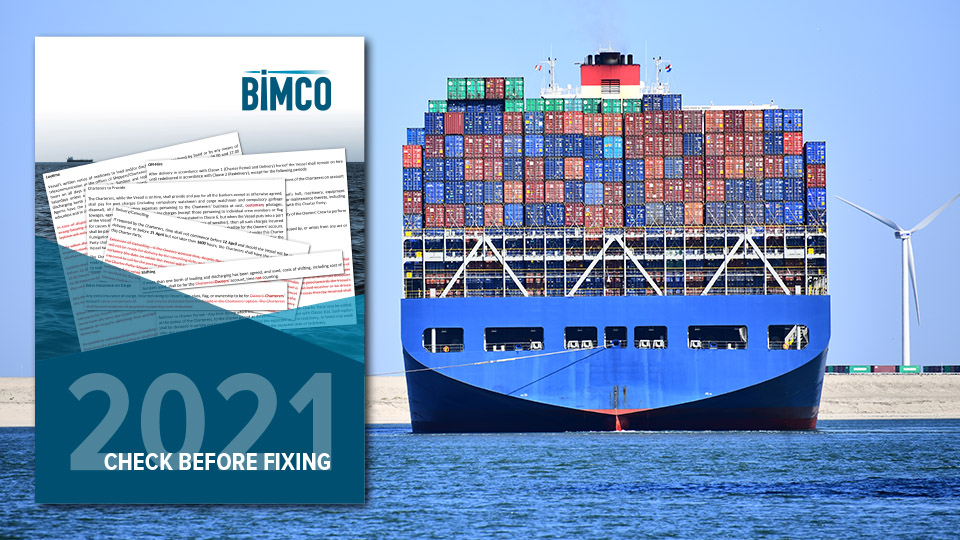ECCTO/EPCA/INTERTANKO/BIMCO's "Standard Chartering Model Clauses for the Chemical/Parcel Trades"
Overview
ECCTO/EPCA/INTERTANKO/BIMCO's "Standard Chartering Model Clauses for the Chemical/Parcel Trades"
1. Compliance Clause
Owners warrant that the vessel complies with all mandatory international regulations being in force at the date of this Charter Party applicable to the contracted voyage and cargo, and that the vessel has onboard the necessary valid certificates.
2. Cleaning Clause
(a) If on presentation, the Charterers' Inspector rejects the vessel due to insufficient cleanliness, Owners shall perform further cleaning in accordance with any reasonable recommendations of Charterers' Inspector.
Should the vessel's tanks, pipes and pumps not be clean to the reasonable satisfaction of the Charterers' Inspector within the cancelling time, then the Charterers shall have the option to cancel this Charter Party which shall then be null and void, or to demand further cleaning up to .... hours. Should the vessel after such further cleaning still not be accepted by the Charterers' Inspector, both parties shall have the option of cancelling this Charter Party which shall then be null and void.
(b) Owners shall have no liability towards Charterers if the Charter Party is cancelled in accordance with sub-clause (a) second paragraph above. Charterers shall have no liability towards Owners due to a cancellation of the Charter Party in accordance with sub- clause (a) second paragraph above, provided the cancellation is based on a reasonable and good faith evaluation of the vessel's cleanliness.
(c) The acceptance of the vessel by Charterers' Inspector shall not limit the liability the Owners might otherwise have for cargo being contaminated by the vessel.
3. Sampling Clause
The Charterers shall arrange for proper samples to be drawn, sealed and marked in the presence of an officer of the vessel. One set of the samples shall free of charge be given to the vessel as Owners' property. Time used for sampling and analysis of the samples shall count as laytime or as time on demurrage.
Owners' samples shall be properly stored and disposed of in a safe manner. Charterers may request a particular disposal procedure against covering all related expenses.
4. Cargo Transfer Clause
At no time during the voyage shall cargo be transferred between vessel's tanks without the express consent of Charterers. Such consent shall be requested by means of written telex or radio communication specifying loaded and revised ullages and cargo quantities for the tanks concerned and reasons necessitating a cargo transfer. Consent of Charterers shall not be unreasonably withheld and shall be provided expeditiously by written telex or radio communication. Master to confirm to Charterers that operation has been carried out.
In the event transfer of cargo is unavoidable for emergency reasons involving risk to vessel's structural integrity or safety of life or for safe navigation, the prior consent of Charterers shall not be required. However, the Master shall inform Charterers of any such circumstances as soon as possible thereafter by written telex or radio communication.
5. Completion/Rotation Clause
Owners shall have the liberty of loading and/or discharging other part cargo(es) for the account of other Charterers or shippers from port or ports en route or not en route for port or ports en route or not en route. The rotation of loading and discharging ports, or berths in those ports to be at Owners' option.
When Owners exercise their option(s) this shall in no way constitute a deviation, notwithstanding anything else contained in this Charter Party.
Charterers shall procure that the Owners' option(s) as provided for in this clause shall be duly incorporated in Bills of Lading issued under this Charter Party.
6. Segregation of Cargo Clause.
(a) Owners shall keep Charterers' cargo segregated from any other cargo during loading, transit and discharge, and shall provide separate pump and line for each grade, unless otherwise agreed.
(b) Cargo shall not come in contact with copper, bronze or brass.
(c) Cargo vulnerable to heat shall not be stowed adjacent to tanks containing heated cargo or otherwise be subject to heat.
7. Nitrogen Clause
Nitrogen blanket, if required, shall be supplied by Charterers in their time and at their expense and shall be maintained by vessel during transit to its destination and until commencement of discharge.
8. Inhibitor Clause
Cargoes which are exposed to the risk of polymerization during the voyage shall sufficiently be inhibited by the Charterers before or during the loading. The Charterers shall provide the vessel with a certificate of inhibition specifying:
(a) Name and amount of inhibitor added.
(b) Date inhibitor was added and the duration of effectiveness.
(c) Any temperature limitations qualifying the inhibitor's effective lifetime.
(d) The action to be taken should the length of the voyage exceed the effective lifetime of the inhibitor.
9. Laytime and Demurrage Clauses.
(a) Laytime and Demurrage Calculations
Laytime and demurrage are to be calculated and settled in accordance with the provisions of this Charter Party, irrespective and independent of any laytime and demurrage calculations under charter parties for other part cargo(es) on board.
(b) Special Laytime and Demurrage Provisions
Owners can give notice of readiness in accordance with the provisions of this Charter Party, notwithstanding that other part cargo(es) may be loaded or discharged first at other berths. However, time used for the loading or discharging of other part cargo(es) at other berths (than designated for the part cargo under this Charter Party), shall not count as laytime or as time on demurrage under this Charter Party, and time used in shifting between the different berths for loading or discharge of different cargoes, shall not count as laytime or as time on demurrage under this Charter Party.
10. Chemical Waste Disposal Clause
(a) If before sailing from discharge port a mandatory prewash of cargo tanks, in accordance with requirements as per MARPOL 73/78 Annex II, is necessary, it is to be performed in direct continuation upon completion of discharging cargo, in conformity with vessel's "Procedures and Arrangements Manual" and in accordance with local port regulations.
Time used for such mandatory prewash shall be for Owners' account.
(b) On being notified by Owners, or their representatives, upon sailing from load port or latest when discharging port(s) is (are) nominated, Charterers shall provide suitable and adequate facilities which shall be immediately available and accessible to the vessel upon completion of discharge for the reception of such washing water/cargo residue mixture originating from cargo carried under this Charter Party and respective Bill(s) of Lading.
(c) The cost for the use of such facilities and responsibility for ultimate disposal of the cargo residue mixture shall be for Charterers' account.
(d) In the event that vessel is ordered to vacate the discharging berth to perform the mandatory pre-wash, as provided under paragraph (a) above, any shifting expenses and additional bunker costs to be for Charterers' account.
Time used in shifting shall count as laytime or if vessel is on demurrage, as time on demurrage.
Any delay in providing the necessary reception facilities and time used for discharging cargo residues mixture shall count as laytime or, if vessel is on demurrage, as time on demurrage.
(e) Any action or lack of action taken under this clause shall not prejudice any other rights or obligations of the parties.
Related Help & Advice
Create or edit a contract
The one-stop digital shop for all the standard maritime contracts and clauses you’ll ever need.
Latest Related News
-
BIMCO adopts portfolio of four ETS clauses
The shipping industry is facing an increase in new regulations from the International Maritime Organization (IMO) and the European Union (EU) and an increase in the urgency to decarbonise. To support the industry, BIMCO has developed a portfolio of new emission trading scheme (ETS) clauses.
-
BIMCO adopts new CII clause for Voyage Charter Parties
The shipping industry is facing an increase in new regulations from the International Maritime Organization (IMO) and the European Union (EU) and an increase in the urgency to decarbonise. To support the industry, BIMCO has developed a new CII Clause for Voyage Charter Parties. The clause was adopted by BIMCO’s Documentary Committee on 11 October and is the latest addition to BIMCO’s portfolio of carbon clauses.
-
BIMCO’s CII clause adopted
The BIMCO Documentary Committee has adopted a CII Operations Clause for Time Charter Parties which will help the industry commercially navigate the complexities of the new CII regulations from the International Maritime Organization (IMO).
-
Fumigation
BIMCO providing information and guidance relating to fumigation of cargoes that are shipped under the IMSBC Code, the Grain Code and the IMDG Code.
-
BIMCO publishes EEXI Transition Clause ahead of IMO efficiency regulation
New regulation from the International Maritime Organization (IMO), which will require existing ships to reduce carbon emissions, is due to enter into force in just under one year. As compliance will benefit to a large extent from co-operation between shipowners and charterers, BIMCO has developed a new clause to address the changes.
ELSEWHERE ON BIMCO
Holiday calendar
BIMCO's Holiday Calendar covers general holidays in over 150 countries, plus local holidays and working hours in more than 680 ports around the world.
Learn about your cargo
For general guidance and information on cargo-related queries.




